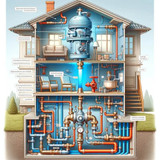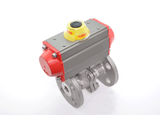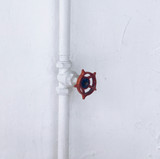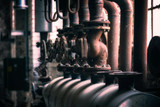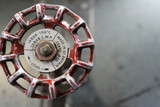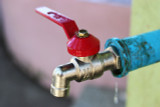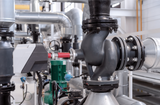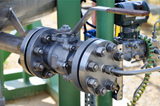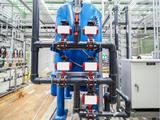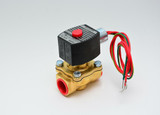CPVC Valves
There are no products listed under this category.
If you're looking to enhance your systems with high-performance CPVC valves, you're in the right spot. Our valves are sourced from leading manufacturers and are perfect for applications requiring robust chemical resistance and high-temperature tolerance.
Take a look at our offerings and see how Valveman can provide the reliable valve solutions you need. Let's get started on improving your operations today.
What Are CPVC Valves?
CPVC (Chlorinated Polyvinyl Chloride) valves are a type of industrial valve made from a thermoplastic material known for its excellent chemical resistance and high-temperature tolerance. CPVC is an advanced PVC (Polyvinyl Chloride) that undergoes a chlorination process, enhancing its properties and making it suitable for more demanding applications.
Compared to standard PVC valves, CPVC sets the mark for high-temperature resistance. In fact, a typical CPVC can withstand temperatures of up to180°F making it suitable for hot water distribution systems. In the same vein, these valves are well-engineered to control the flow of colder fluids, speeding up factory operations significantly.
Advantages of CPVC Valves
Corrosion Resistance
- CPVC valves offer excellent resistance to corrosion caused by chemicals, salts, and other aggressive substances.
- They do not rust, scale, or pit, ensuring long-lasting performance in harsh environments.
Chemical Compatibility
- CPVC valves are compatible with a wide range of chemicals, including acids, bases, and oxidizers.
- They are suitable for use in chemical processing, water treatment, and other industries dealing with corrosive media.
Lightweight and Easy Installation
- CPVC valves are significantly lighter than metal valves, making them easier to handle and install.
- Their lightweight nature reduces the stress on piping systems and supports, simplifying installation and maintenance.
Cost-Effective
- Compared to exotic alloy valves, CPVC valves offer a cost-effective solution for corrosive environments.
- They provide excellent performance at a lower cost, making them an economical choice for many applications.
Wide Temperature Range
- CPVC valves can handle a wide range of temperatures, typically from 32°F to 180°F (0°C to 82°C).
- They maintain their strength and dimensional stability even at elevated temperatures, making them suitable for hot water systems.
Low Friction Loss
- CPVC valves have smooth interior surfaces, which minimize friction loss and promote efficient flow.
- This reduces pressure drop and improves system performance, saving energy and operational costs.
Types of CPVC Valves
CPVC valves come in various designs. Below are some examples, but this list isn’t exhaustive:
These components contain a rotating ball, which functions as an ON/OFF switch for precise flow control.
Features:
- One-piece design requiring no adjustment.
- Bubble-tight shut-off with EPDM O-ring seals and PTFE seats. Learn more about seal selection for valves.
- High-impact polypropylene handle, suitable for potable water systems.
Check valves control the flow of liquid in only one direction. There is no backflow whatsoever, which makes them efficient for pumps and irrigation.
Features:
- Prevents backflow, ensuring unidirectional flow.
- Commonly used in pump systems and irrigation setups.
Butterfly valves are used for isolating or regulating flow. They are quick to operate and suitable for large-diameter pipes.
Features:
- Quick and easy operation with a simple quarter-turn action.
- Ideal for applications requiring quick shut-off.
Applications of CPVC Valves
CPVC valves are used in a variety of settings due to their durability and resistance to high temperatures.
- Chemical Processing: Handling aggressive chemicals and corrosive fluids.
- Water Treatment: Use in water distribution systems, including potable water.
- Industrial Processes: Suitable for various industrial applications where chemical resistance and durability are essential.
- HVAC Systems: Used in heating, ventilation, and air conditioning systems for fluid control.
- Plumbing: Widely used in residential and commercial plumbing systems for hot and cold water distribution.
Certifications and Codes
Like other ball valves, CPVC valves are NSF-certified, and safe for use in drinking water systems. Before you purchase a valve for residential, commercial, or industrial use, make sure to check local building codes. This way, you can identify, use, and install the appropriate CPVC valve for the application.
Discover the Reliability of CPVC Valves at Valveman
CPVC valves are a reliable and cost-effective solution for various industrial and commercial applications involving corrosive media and demanding environments. With their exceptional chemical resistance, lightweight design, and wide temperature range, CPVC valves offer superior performance and long-lasting durability.
At Valveman, we offer a comprehensive range of high-quality CPVC valves designed to meet the specific needs of our customers. Our valves are manufactured to the highest standards, ensuring reliable operation and optimal flow control in even the most challenging conditions.
Don't compromise on quality when it comes to your critical applications. Choose Valveman's CPVC valves.
Additional Resources
For detailed technical information, check out these references on CPVC valves:
- https://www.bobvila.com/articles/what-is-cpvc/
- https://medium.com/@petronthermoplast01/all-major-features-and-technical-specifications-of-cpvc-ball-valve-67308649885e
Our Posts
View AllIntroducing Apollo Valves
Apollo Valves® inventory includes a wide range of valve products supplied to diverse markets. Th …
Read MoreUnderstanding Valve Sizes and Measurement
Sizing the appropriate valve is critical to ensuring the performance of your system. Whether you'r …
Read MoreTypes of Water Valves
Hey there, fellow valve enthusiasts! We all know that valves play a crucial role in regulating th …
Read MoreWhat is a Backflow Preventer, and How Does it Work?
When a simple check valve is inadequate for the job, you need a backflow preventer. But knowing …
Read MoreValve inspection - main points of valve testing in Manufacture setting
Industrial facilities rely on different types of valves (such as check valves, for example) to con …
Read MoreTypes of Ball Valves
Ball valves are important components in a vast range of systems, from small family-owned workshops …
Read MoreUnderstanding valve standards and specifications
Hey there, fellow valve enthusiasts! Today, we're looking at valve codes, standards and specifica …
Read MoreHow to Tell if a Valve is On or Off
We have all been there before. You are staring at a valve; you know that you should know if it …
Read MoreUnderstanding Different Types of Valve Connections and Fittings
Hey there, fellow valve enthusiasts! We know valves play a crucial role in regulating the flow of li …
Read MoreTypes of Valve Handles: Lever and Handwheels
Whether you're involved in industrial work, plumbing, or you're a DIY enthusiast, you come across va …
Read MoreThe Basic Parts of a Valve
Valves quietly work in many different areas, even places you wouldn't expect. They're truly every …
Read MoreGas Ball Valves In Industrial Applications - 5 Things to Keep in Mind
Unlike the standard ball valves, most gas ball valves are tested and approved by CSA. These valves a …
Read MoreHow To Correctly Use A 3 Way Valve In Different Applications
To understand the "T"-port and an "L"-port 3-way valves and what makes them different, it's importan …
Read MoreIndustrial Ball Valves - 9 Questions To Make The Right Choice
Ball valves are versatile flow control devices suitable for extensive industrial applications. They …
Read MoreEverything you need to know about valve types
Valves play crucial roles in production lines and equipment performance across a multitude of ind …
Read MoreWhat is a Duty Cycle and How Does it Relate to Electric Ball Valves?
Electric actuation improves the efficiency of processes by maintaining the accuracy of the re …
Read MoreActuated Butterfly Valves 101: All You Need To Know About Their Application In Piping Systems
Butterfly valves are quarter-turn flow control or isolation devices, used for quick shut-off in p …
Read MorePractical Guide To Electric and Pneumatic Actuators – Which One To Choose?
While electrical and pneumatic actuators have several unique benefits and are preferred in differ …
Read MoreHow Do Check Valves Affect Water Pressure in the Piping System?
Check valves also known as "one-way" valves are autonomously operated unidirectional valves that all …
Read MoreUsing an Actuated Ball Valve Or a Solenoid Valve For Best Fluid Control In The System
Both ball valves and solenoid valves serve a wide variety of applications. From a&nb …
Read More


